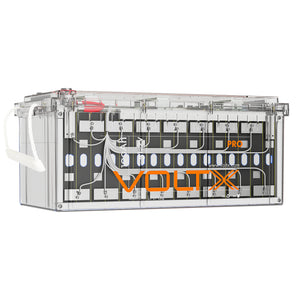Standard 12V batteries are great for most outdoor applications. If you need something with higher power output, you can always go for 24V batteries, but have you ever used 48V batteries? Now, this is efficiency at its highest level, particularly they are 48V lithium batteries. High-voltage batteries like these are ideal for those who need extra power output. They also have the advantage of increased power without having to raise the current, which can require expensive cable works. A 48V lithium battery is perfect as an off-grid battery and even as a service battery in dual battery setups
What Are 48V Lithium Batteries?
A lot of lithium batteries on the market use 12 volts as the standard voltage level. However, there are times when the operating voltage is a little larger, causing problems with insufficient voltage output. This is where the benefits of 48V lithium batteries come in. They have increased efficiency, better charging/discharging rate, and stronger temperature adaptability. 48V lithium batteries are significantly lighter plus, these lithium battery systems can help you save up too. These batteries are able to run more appliances with fewer amps running through the wiring and allow for a more direct energy path that helps reduce consumption.
Just like other batteries, 48V lithium batteries have different types too. The most popular ones would be the 48V lithium-ion batteries and the 48V lithium iron phosphate batteries or LiFePO4. Li-ion batteries work well but have a reputation for being explosive at times, unlike LiFePO4 batteries which are built to be incombustible. LiFePO4 batteries are also better in overall performance and lifespan. They are also usually considered deep cycle batteries, so you can safely discharge them down to 80% without incurring any damage. Going for 48V lithium batteries means enjoying the perks of having a built-in battery management system (BMS). This component keeps every cell in your battery in optimal condition while preventing common battery issues such as overheating and short circuits.
What Makes a Good BMS For 48V Lithium Batteries?
Let's talk more about the BMS of 48V lithium batteries. Integrated battery management systems are usually found in LiFePO4 batteries. The downside here is that lithium battery prices are mostly expensive so some campers opt for cheap batteries that offer similar composition and benefits. This may or may not be an issue depending on how you pick your battery pack. Some providers claim to have the same quality as normally-priced lithium batteries with built-in BMS but will end up costing you more. Take note: whether you're using 48V lithium batteries or any other rechargeable lithium battery, a good BMS should consist of a CPU, voltage and temperature control feature, current collection module, and a communication interface.
Performance-wise, a BMS should work with every single cell in your battery to detect and display its voltage, current and reserve power. It should also indicate the temperature of your entire battery box, the highest and lowest cell voltage, and the charge/discharge level of your power pack. Lastly, see to it that the protective features include an indicator and control of over-voltage, under-voltage, high/low temperature, short circuit, and other limit conditions.
How To Charge 48V Lithium Batteries?
Charging 48V lithium batteries is no different than charging other lithium batteries of different voltage levels. If you're topping it off from a charger, make sure to use the appropriate lithium battery charger to avoid damage. Using solar energy instead? Go for solar panels with the same voltage and see to it that all the other parameters are within the normal level. Use a solar charge controller when connecting your battery pack to your panels to regulate the energy from the sun which will eventually be stored in your power pack.
Another important component when charging 48V lithium batteries is the protection board or circuit board. This is especially relevant in recharging li-ion batteries which have no integrated battery management systems. A circuit board is made up of electronic circuits that monitor the voltage of your battery cells as well as the current charging and discharging circuit within -40℃ to +85℃ temperatures. This protection board also plays a crucial role when charging your batteries in parallel or series as it helps monitor the status of each battery in the connection.
The charging time of 48V lithium batteries varies depending on their state of charge, capacity, mode of charging, and battery type. LiFePO4 batteries tend to charge faster compared to lithium-ion batteries. A standard 100Ah lithium battery will also recharge within a shorter time compared to a 400Ah lithium battery provided that both battery packs are empty. If you're using solar panels, there are separate factors to consider too such as solar panel efficiency, weather, and mounting angle.
More from Outbax
Aside from camping batteries, 48V batteries have a lot of other recreational applications. There are 48V lithium batteries for golf carts and also 48V lithium batteries for electric bikes. Want your own power pack too? Go to Outbax now! There’s no need to search for “batteries near me” anymore. Simply browse through our lithium batteries for sale, select your pick, check out, and wait for it to arrive. Check out our famous clear-cased 48V lithium battery. We even have other portable power sources available for those who are looking for an alternative such as solar panels and inverter generators. The best part? We offer them at an affordable price without compromising on quality to accommodate anyone looking for a great outdoor adventure. Shop now!
Frequently Asked Questions
- What Are 48V Lithium Batteries?
- What Makes a Good BMS For 48V Lithium Batteries?
- How To Charge 48V Lithium Batteries?


